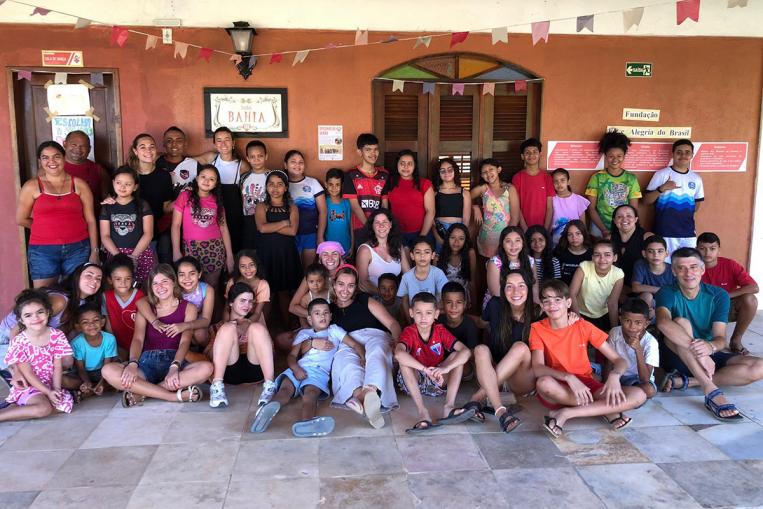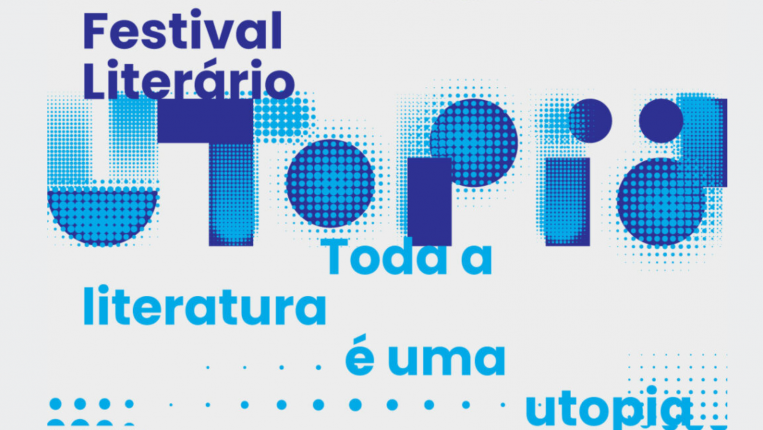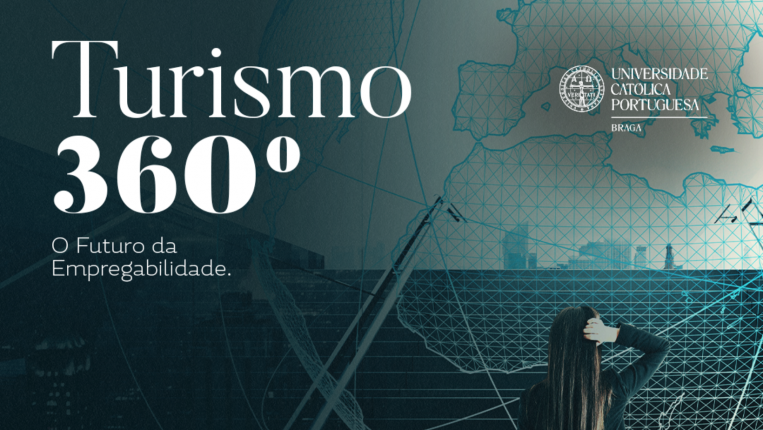Eleven students from Universidade Católica Portuguesa went on a volunteering mission as part of FLY, the volunteering and service-learning programme in which UCP is a partner. It was an unforgettable and life-changing experience. From the four campuses of the Portuguese Catholic University and with the coordination of Católica Solidária (CASO) in Porto, 11 students set off on different volunteering missions in Spain, Italy, Morocco and Brazil. In addition to the participation of UCP students in international missions, around 40 foreign volunteers also took part in national missions.
The Catholic University students - Catarina Rebelo de Almeida (Porto), Francisca Bento (Viseu), Daniela Barbosa (Braga) and Francisco Cabral (Lisbon) - had truly life-changing experiences. ‘International volunteering is an extremely enriching experience because, as well as developing the skills associated with any kind of volunteering, it also allows students to immerse themselves in different cultures, traditions and lifestyles, expanding their horizons and fostering reflection and mutual understanding between individuals from different cultures and backgrounds,’ explains Carmo Themudo, coordinator of the Integral Development of the Person Unit (UDIP) at the Catholic University in Porto.

The big impact of small actions
Catarina Rebelo de Almeida, a student at the Porto School of Law of the Catholic University, was in Vazantes, a small community in the interior of Brazil. ‘It was one of the most remarkable experiences of my life and I'm very grateful to all the people who made it possible. But especially to the people of Vazantes, who taught me the true meaning of humility and simplicity, the true joy of small things and the power of a simple smile,’ she shares.
Catarina Rebelo de Almeida took part in organising workshops for children and young people aged 6 to 18: Spanish lessons, dance games, painting, drawing, handicrafts and many other activities. ‘As we only volunteered in the mornings, we spent our afternoons in different ways. Many days we were taught Capoeira and Maracatu (a cultural manifestation from Pernambuco that has African origins and contains musical and dance elements), which allowed us to immerse ourselves in Brazilian culture and learn many new skills. In the free afternoons we would go to football matches, band rehearsals, chat to people, plan activities for the next day, or simply play in the street with the children,’ she shares.
A memorable moment was when a priest told us that in the past they used to ask the children what they would like to do when they grew up and they said they wanted to be fishermen and farmers. Now, after starting this volunteering programme, when they are asked exactly the same question, they say that their biggest dream is to be a university student. This sharing really struck me and made me think about the big impacts that small actions can have.’
Understanding the world better
Francisca Bento, a dental student in Viseu, was a volunteer at Cáritas Diocesana in Madrid. She spent time in Cercedilla - ‘where every day was fun, as I spent it tutoring dozens of children, where we did countless activities, hikes and games, and where I realised that, with the simple, we can do a lot’ - and in Hiruela, ‘a very small village with few inhabitants, where our main objective was to keep them company and help them with various tasks’.
Greatest lesson learnt? ‘I learnt to understand the world better and to be even more certain that small actions can make a difference when it comes to building a better world with more solidarity. I feel very grateful for all the moments I've experienced, all the lessons I've learnt and all the people I've met. I'm sure I'll carry it with me forever.’
An experience of great personal growth
Daniela Barbosa, a psychology student at the Catholic University in Braga, was in Seville for the Spanish Red Cross, working with children on various activities - ‘The children's joy was fascinating. The recreational activities, such as games and sports that we organised, were equally fun and important. We organised football tournaments and basketball games, where everyone took part with great enthusiasm. These activities helped promote team spirit and friendship among the children, as well as encouraging a healthier lifestyle.’
A gratifying moment? ‘When, in conversation with a boy, we realised that the project hadn't existed for a few years due to a lack of volunteers. This gave us even more strength to make the most of our time with them.’
‘It has undoubtedly been an experience of great personal growth, a lot of work, a lot of sharing, but above all, an experience with a lot of love. I'm sure this will be the first of many more volunteering experiences in my life,’ says the student.
Volunteering is about humanity
Francisco Cabral, a student at the Faculty of Human Sciences in Lisbon, was in Melilla (Morocco) working with young migrants: ‘Our activities on the ground consisted mainly of preparing daily tasks and team meetings in the mornings. In the afternoon, we dedicated ourselves to giving Spanish lessons, facilitating the integration of newly arrived migrants. In the evenings, we were involved in cooking and distributing meals, a task that united volunteers and migrants around a common cause.’
Regarding the training that each volunteer receives before going on mission, Francisco Cabral believes that ‘this initial preparation was fundamental to mitigate uncertainties and to face the challenges with more confidence.’ ‘I remember the story of a 15-year-old who swam for eight hours to reach Melilla, losing his best friend in the process, or a 24-year-old who crossed five bays, each with seven metres of barbed wire and huge ditches between them, under heavy guard, facing police violence on both sides. Hearing these stories in person is very different from seeing them on television - giving them faces and names makes everything more real and painful. This is the point I believe is fundamental to remember: these stories are not statistics, they are human lives. This volunteering is about humanity,’ the student shares.
A surprising moment? ‘When my flight home was delayed for two days... What could have been an unpleasant situation turned into one of the best memories I carry with me. The local volunteers welcomed me in a warm and fraternal way, and in addition, the association had started renovating its space with paintings. I decided to join the migrants who were involved in this project. It was a moment of celebration and deep symbolism.’
The involvement of the 4 campuses of Católica
The involvement of the 4 Catholic campuses in the project is a great satisfaction for the University's unified dimension. Carmo Themudo, coordinator of the UDIP, says that the involvement of the UCP's four geographies ‘reflects the collaborative and coordinated effort of four different locations to help fulfil the University's mission with the integral education of students and service to the Community’.
The FLY programme, which reinforces the commitment of the participating universities to sustainable development, aims - above all - to make university communities aware of the problems of migration and refugees and people at risk of social exclusion and to highlight projects to care for people and the community. Coordinated by the Spanish Universities of Comillas (Madrid), the University of Deusto (Bilbao) and ESADE (Barcelona), FLY 2024 brings together, in addition to the Portuguese Catholic University, the Universities of Loyola (Andalusia, Spain), LUMSA (Rome, Italy) and Mateja Bela (Banská Bystrica, Slovakia) and IQS (Barcelona, Spain).



